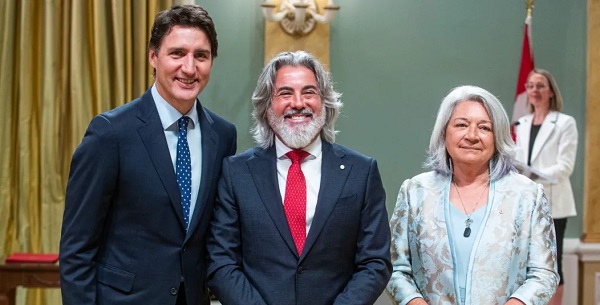Business
Business Stoplight: La Boheme Beauty & Skin

This week’s Business Spotlight shines on La Boheme Beauty & Skin. This Amazing place offers a truly remarkable atmosphere, Leaving you feeling pampered and special. Don’t just take our word for it. Check out their Facebook page to see all the fuss about La Boheme Beauty & Skin | Facebook
What is your business?
Beauty, Medical esthetics, and Retail businesses. The services are luxury + Modern, and the retail is local and curated.

What makes your business unique?
My business is unique because it is a full-service beauty studio with a bridal or event glam area for large groups. The retail is also uniquely curated and local.

What are some products/services that you offer?
Medical Skincare likes Glymed pluss & Medi Kate, NUDA sunless products, Wide-brimmed hats, Clothing, Make-up, Brows, Spray Tanning, Facials and more.

Why did you choose Downtown Red Deer as the location for your business?
I like the Traffic, Various businesses and cozy feeling.

What do you think makes Downtown vibrant?
The people, The businesses and the mature Landscape

I love Downtown Red Deer because…
Of the vibrance & diversity
Follow La Boheme Beauty & Skin on social Media
La Boheme Beauty & Skin | Facebook
PRO MAKE UP + BROWS + SKIN (@labohemebeautyandskin) • Instagram photos and videos
Alberta
Emissions Reduction Alberta offering financial boost for the next transformative drilling idea

From the Canadian Energy Centre
$35-million Alberta challenge targets next-gen drilling opportunities
‘All transformative ideas are really eligible’
Forget the old image of a straight vertical oil and gas well.
In Western Canada, engineers now steer wells for kilometres underground with remarkable precision, tapping vast energy resources from a single spot on the surface.
The sector is continually evolving as operators pursue next-generation drilling technologies that lower costs while opening new opportunities and reducing environmental impacts.
But many promising innovations never reach the market because of high development costs and limited opportunities for real-world testing, according to Emissions Reduction Alberta (ERA).
That’s why ERA is launching the Drilling Technology Challenge, which will invest up to $35 million to advance new drilling and subsurface technologies.
“The focus isn’t just on drilling, it’s about building our future economy, helping reduce emissions, creating new industries and making sure we remain a responsible leader in energy development for decades to come,” said ERA CEO Justin Riemer.
And it’s not just about oil and gas. ERA says emerging technologies can unlock new resource opportunities such as geothermal energy, deep geological CO₂ storage and critical minerals extraction.
“Alberta’s wealth comes from our natural resources, most of which are extracted through drilling and other subsurface technologies,” said Gurpreet Lail, CEO of Enserva, which represents energy service companies.
ERA funding for the challenge will range from $250,000 to $8 million per project.
Eligible technologies include advanced drilling systems, downhole tools and sensors; AI-enabled automation and optimization; low-impact rigs and fluids; geothermal and critical mineral drilling applications; and supporting infrastructure like mobile labs and simulation platforms.
“All transformative ideas are really eligible for this call,” Riemer said, noting that AI-based technologies are likely to play a growing role.
“I think what we’re seeing is that the wells of the future are going to be guided by smart sensors and real-time data. You’re going to have a lot of AI-driven controls that help operators make instant decisions and avoid problems.”
Applications for the Drilling Technology Challenge close January 29, 2026.
armed forces
Global Military Industrial Complex Has Never Had It So Good, New Report Finds


From the Daily Caller News Foundation
The global war business scored record revenues in 2024 amid multiple protracted proxy conflicts across the world, according to a new industry analysis released on Monday.
The top 100 arms manufacturers in the world raked in $679 billion in revenue in 2024, up 5.9% from the year prior, according to a new Stockholm International Peace Research Institute (SIPRI) study. The figure marks the highest ever revenue for manufacturers recorded by SIPRI as the group credits major conflicts for supplying the large appetite for arms around the world.
“The rise in the total arms revenues of the Top 100 in 2024 was mostly due to overall increases in the arms revenues of companies based in Europe and the United States,” SIPRI said in their report. “There were year-on-year increases in all the geographical areas covered by the ranking apart from Asia and Oceania, which saw a slight decrease, largely as a result of a notable drop in the total arms revenues of Chinese companies.”
Notably, Chinese arms manufacturers saw a large drop in reported revenues, declining 10% from 2023 to 2024, according to SIPRI. Just off China’s shores, Japan’s arms industry saw the largest single year-over-year increase in revenue of all regions measured, jumping 40% from 2023 to 2024.
American companies dominate the top of the list, which measures individual companies’ revenue, with Lockheed Martin taking the top spot with $64,650,000,000 of arms revenue in 2024, according to the report. Raytheon Technologies, Northrop Grumman and BAE Systems follow shortly after in revenue,
The Czechoslovak Group recorded the single largest jump in year-on-year revenue from 2023 to 2024, increasing its haul by 193%, according to SIPRI. The increase is largely driven by their crucial role in supplying arms and ammunition to Ukraine.
The Pentagon contracted one of the group’s subsidiaries in August to build a new ammo plant in the U.S. to replenish artillery shell stockpiles drained by U.S. aid to Ukraine.
“In 2024 the growing demand for military equipment around the world, primarily linked to rising geopolitical tensions, accelerated the increase in total Top 100 arms revenues seen in 2023,” the report reads. “More than three quarters of companies in the Top 100 (77 companies) increased their arms revenues in 2024, with 42 reporting at least double-digit percentage growth.”
-

 Agriculture2 days ago
Agriculture2 days agoHealth Canada pauses plan to sell unlabeled cloned meat
-

 Artificial Intelligence2 days ago
Artificial Intelligence2 days agoGoogle denies scanning users’ email and attachments with its AI software
-

 Health2 days ago
Health2 days agoOrgan donation industry’s redefinitions of death threaten living people
-

 National2 days ago
National2 days agoAlleged Liberal vote-buying scandal lays bare election vulnerabilities Canada refuses to fix
-

 COVID-191 day ago
COVID-191 day agoFDA says COVID shots ‘killed’ at least 10 children, promises new vaccine safeguards
-

 Alberta1 day ago
Alberta1 day agoNet Zero goal is a fundamental flaw in the Ottawa-Alberta MOU
-

 National2 days ago
National2 days agoEco-radical Canadian Cabinet minister resigns after oil deal approved
-

 Addictions1 day ago
Addictions1 day agoManitoba Is Doubling Down On A Failed Drug Policy






